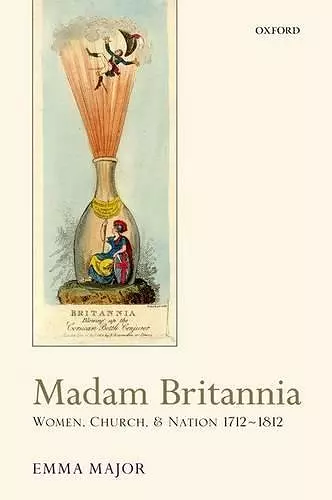Madam Britannia
Women, Church, and Nation 1712-1812
Format:Hardback
Publisher:Oxford University Press
Published:1st Dec '11
Currently unavailable, and unfortunately no date known when it will be back

Madam Britannia: Women, Church, and Nation, 1712-1812 explores the complex and fascinating relationship between women, Protestantism, and nationhood. Opening with a history of Britannia, this book argues that Britannia becomes increasingly popular as a national emblem from 1688 onwards. Over the eighteenth century, depictions of Britannia become exemplary as well as emblematic, her behaviour to be imitated as well as admired. Britannia takes life during the eighteenth century, stepping out of iconic representation on coins, out of the pages of James Thomson's poetry, down from the stage of David Mallett's plays, the frames of Francis Hayman and William Hogarth's paintings, and John Flaxman's monuments to enter people's lives as an identity to be experienced. One of the key strands explored in this book is Britannia's relationship to female personifications of the Church of England, which themselves often drew on key Protestant Queens such as Elizabeth I and Anne. But during the eighteenth century, Britannia also gained cultural status by being a female figure of nationhood at a time when Enlightenment historians developed conjectural histories which placed women at the centre of civilisation. Women's religion, conversation, and social practice thus had a new resonance in this new, self-consciously civilised age. In this book, Emma Major looks at how narratives of faith, national identity, and civilisation allowed women such as Elizabeth Burnet, Elizabeth Montagu, Catherine Talbot, Anna Laetitia Barbauld, Hester Lynch Thrale Piozzi, and Hannah More to see themselves as active agents in the shaping of the nation.
[This is] a wonderfully rich and impressive study. It provides an original new assessment of women's public and religious sensibilities, and it also demonstrates convincingly that female religiosity was central to contemporaries' conceptualization of public life. * Kathryn Gleadle, The Journal of British Studies *
Madam Britannia is sweeping but only in the best sense of the word. The writing is clear, the ideas relevant, and the research admirable. Such engagement with wide sweeping primary texts is demanding work, and readers will appreciate Major for doing so with such aplomb. * Kathryn Stasio, ABO: Interactive Journal for Women in the Arts *
Exceptional scholarship ... Major's strength lies in her nearly exhaustive cataloguing of relevant media ... I will take a moment to celebrate this book as a superb example of a cultural studies approach * Robin Runia, The Journal for Early Modern Cultural Studies *
This exhaustively researched and heavily annotated study ... goes beyond its precursors and into fascinating new territory ... This is an important book for academics * Michael Wheeler, Church Times *
the wide-ranging nature of Emma Major's research and analysis provides rich and convincing evidence of how important this relationship was and will hopefully stimulate further research into other aspects of its complexity. This book makes a very valuable contribution to our understanding of gender, religion and British nationalism in the long eighteenth century and is highly recommended. * Joanna Cruickshank, Archives *
ISBN: 9780199699377
Dimensions: 240mm x 164mm x 34mm
Weight: 722g
384 pages